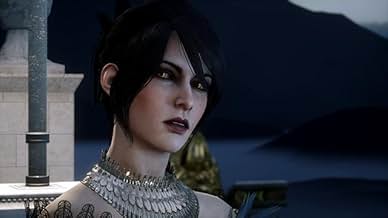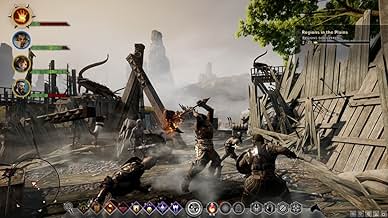When the Conclave is destroyed, leaving only one survivor, demons are loosed up on the world. In an attempt to restore order and save the world, the survivor--now the inquisitor-- instigates... Read allWhen the Conclave is destroyed, leaving only one survivor, demons are loosed up on the world. In an attempt to restore order and save the world, the survivor--now the inquisitor-- instigates the long forgotten inquisition.When the Conclave is destroyed, leaving only one survivor, demons are loosed up on the world. In an attempt to restore order and save the world, the survivor--now the inquisitor-- instigates the long forgotten inquisition.
- Nominated for 1 BAFTA Award
- 11 wins & 19 nominations total
Jon Curry
- Male Inquisitor
- (voice)
Alastair Parker
- Blackwall
- (voice)
James Norton
- Cole
- (voice)
Ramon Tikaram
- Dorian
- (voice)
Robyn Addison
- Sera
- (voice)
Gareth David-Lloyd
- Solas
- (voice)
Brian Bloom
- Varric Tethras
- (voice)
Indira Varma
- Vivienne
- (voice)
Greg Ellis
- Cullen
- (voice)
- (as Gregory Ellis)
Allegra Clark
- Josephine Montilyet
- (voice)
- …
Corinne Kempa
- Leliana
- (voice)
Kate Mulgrew
- Flemeth
- (voice)
Claudia Black
- Morrigan
- (voice)
Storyline
Did you know
- TriviaCrestwood had a significantly different appearance in the PAX Prime 2013 demo than it does in the final game. In the demo Crestwood was a vivid, thriving area filled with soldiers and castles. In the final game however, it's depicted as gloomy, rainy, and overrun with demons.
- GoofsDennet, the horsemaster in the Hinterlands, directs you to your new horse: "the chestnut," but the horse is clearly a bay, as depicted by the black points.
- Quotes
Varric Tethras: You want to talk about me? I'm flattered. Also, inclined toward extravagant lies.
Featured review
Dragon Age: Inquisition is a true masterpiece in the world of role-playing games, and it successfully continues the famous franchise. After the somewhat disappointing second part, the developers at Bioware clearly learned their lessons and made every effort to ensure that the third installment impresses players with its scale, story, and quality.
One of the main attractions of the game is its vast and meticulously crafted world. It is divided into several regions, each with its unique landscape, atmosphere, and history. Players have the opportunity to explore expansive locations, complete various quests, uncover secrets, and engage in battles with enemies. The developers clearly aimed to make the world feel alive, and they succeeded. However, some activities may seem a bit repetitive - for example, resource gathering or completing minor quests. But overall, the world is vast and impressive.
The game's storyline is another aspect that deserves attention. It continues and develops the events established in previous installments. The main character becomes the leader of the Inquisition, an organization tasked with saving the world from chaos and destruction. The story is full of intrigue, political decisions, and moral dilemmas, making it incredibly engaging. The player's choices once again play a key role in how events unfold, and every decision can have significant consequences for the plot. Some moments make you question the correctness of your actions, adding depth to the narrative.
The return of the ability to choose your race, as in the first part, is a huge plus for many fans. Players can create characters from different races, including humans, elves, dwarves, and qunari. The introduction of qunari as a playable race (finally!) was a long-awaited move that many welcomed with enthusiasm. This choice not only adds diversity to the game but also affects interactions with other characters and the development of the story.
The visual aspect of the game deserves special praise. The graphics are stunning, with detailed textures, realistic lighting effects, and breathtaking landscapes. All the locations are crafted with great attention to detail, and the character and enemy designs look impressive. The game simply shines with its visuals, and even years after its release, it remains one of the most beautiful RPGs on the market.
The combat system in Inquisition also received significant improvements. The game has become more action-oriented, but the tactical component, which was an important part of the previous games, is still present. The player can switch between tactical planning mode and real-time combat. This allows for different strategies in each battle, adding depth to the gameplay.
When the game was first released, there were complaints about grinding - some players noted that the need to gather resources and complete many side quests to progress the story felt a bit overwhelming. However, I didn't experience this issue. While there are some additional tasks, they're not too burdensome and, in fact, add variety to the gameplay. Thanks to the scale of the world and the amount of content, the game never gets boring.
However, there is one aspect that disappointed me slightly - the game's ending. While the entire story develops in an interesting and captivating way, the finale wasn't as epic as I had hoped. The events leading up to the end didn't have the scale I was expecting, leaving a feeling of incompleteness. Perhaps this was done intentionally to leave room for future sequels, but I still wanted a bit more drama.
Overall, Dragon Age: Inquisition is an impressive game that skillfully combines elements of classic RPGs with modern innovations. Despite some flaws, it's a great example of how to create an immersive game universe with a rich story, interesting characters, and a vast world to explore.
One of the main attractions of the game is its vast and meticulously crafted world. It is divided into several regions, each with its unique landscape, atmosphere, and history. Players have the opportunity to explore expansive locations, complete various quests, uncover secrets, and engage in battles with enemies. The developers clearly aimed to make the world feel alive, and they succeeded. However, some activities may seem a bit repetitive - for example, resource gathering or completing minor quests. But overall, the world is vast and impressive.
The game's storyline is another aspect that deserves attention. It continues and develops the events established in previous installments. The main character becomes the leader of the Inquisition, an organization tasked with saving the world from chaos and destruction. The story is full of intrigue, political decisions, and moral dilemmas, making it incredibly engaging. The player's choices once again play a key role in how events unfold, and every decision can have significant consequences for the plot. Some moments make you question the correctness of your actions, adding depth to the narrative.
The return of the ability to choose your race, as in the first part, is a huge plus for many fans. Players can create characters from different races, including humans, elves, dwarves, and qunari. The introduction of qunari as a playable race (finally!) was a long-awaited move that many welcomed with enthusiasm. This choice not only adds diversity to the game but also affects interactions with other characters and the development of the story.
The visual aspect of the game deserves special praise. The graphics are stunning, with detailed textures, realistic lighting effects, and breathtaking landscapes. All the locations are crafted with great attention to detail, and the character and enemy designs look impressive. The game simply shines with its visuals, and even years after its release, it remains one of the most beautiful RPGs on the market.
The combat system in Inquisition also received significant improvements. The game has become more action-oriented, but the tactical component, which was an important part of the previous games, is still present. The player can switch between tactical planning mode and real-time combat. This allows for different strategies in each battle, adding depth to the gameplay.
When the game was first released, there were complaints about grinding - some players noted that the need to gather resources and complete many side quests to progress the story felt a bit overwhelming. However, I didn't experience this issue. While there are some additional tasks, they're not too burdensome and, in fact, add variety to the gameplay. Thanks to the scale of the world and the amount of content, the game never gets boring.
However, there is one aspect that disappointed me slightly - the game's ending. While the entire story develops in an interesting and captivating way, the finale wasn't as epic as I had hoped. The events leading up to the end didn't have the scale I was expecting, leaving a feeling of incompleteness. Perhaps this was done intentionally to leave room for future sequels, but I still wanted a bit more drama.
Overall, Dragon Age: Inquisition is an impressive game that skillfully combines elements of classic RPGs with modern innovations. Despite some flaws, it's a great example of how to create an immersive game universe with a rich story, interesting characters, and a vast world to explore.
Details
- Release date
- Countries of origin
- Official site
- Language
- Also known as
- Dragon Age: Инквизиция
- Production company
- See more company credits at IMDbPro
- Color
Contribute to this page
Suggest an edit or add missing content








































